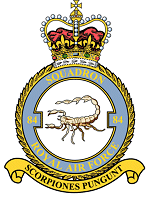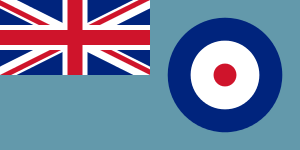No. 84 Squadron RAF
| No. 84 Squadron RAF | |
|---|---|
|
Official Squadron Badge of No. 84 Squadron RAF | |
| Active |
7 Jan 1917 - 30 Jan 1920 13 Aug 1920 - 20 Feb 1953 20 Feb 1953 - 31 Oct 1971 17 Jan 1972 - present |
| Country |
|
| Branch |
|
| Role | Search and Rescue Squadron |
| Part of | Search and Rescue Force |
| Base | RAF Akrotiri |
| Motto(s) |
Latin: Scorpiones pungunt ("Scorpions sting") |
| Helicopter | Bell Griffin HAR.2 |
| Battle honours |
Western Front 1917-1918*, Cambrai 1917, Somme 1918*, Amiens, Hindenburg Line*, Iraq 1920, Iraq 1923-1925, Iraq 1928-1929, Egypt and Libya, 1940-1942*, Greece 1940-1941*, Iraq 1941*, Habbaniya, Syria 1941, Malaya 1942*, North Burma 1944*, Manipur 1944. The Honours marked with an asterix* are those emblazoned on the Squadron Standard |
| Commanders | |
| Notable commanders |
William Sholto Douglas Francis Fogarty |
| Insignia | |
| Squadron Badge heraldry | A Scorpion |
| Squadron Codes |
UR (Apr 1939 - Sep 1939) VA (Sep 1939 - Mar 1941) PY (Jan 1945 - Dec 1946) |
No. 84 Squadron of the Royal Air Force is at present a Search and Rescue Squadron based at RAF Akrotiri, it uses the Bell Griffin HAR.2 helicopter. It is currently the only operational part of the RAF Search and Rescue Force after the stand-down of the UK effort on 5th October 2015.[1]
History
World War I
No. 84 Squadron of the Royal Flying Corps (RFC) was formed on 7 January 1917 at Beaulieu and moved to France in September 1917.[2] It flew the SE.5 over the Western front, at one time based in Bertangles, France until it returned to the UK in August 1919.[3]
Between the wars
The squadron was disbanded on 30 January 1920.[2] Its aces included Andrew Beauchamp-Proctor, Hugh Saunders and Walter A. Southey.
The squadron was reformed on 13 August 1920 at Baghdad in Iraq, moving to Shaibah in September, where it remained for the next 20 years.[3] Its initial equipment was DH.9As (until January 1929) and these were replaced by Wapitis (beginning July 1928),[3] Vincents (December 1935)[4] and Blenheims Mk.Is ( February 1939).[5]
World War II
The Squadron moved to Egypt in September 1940.
It operated in Greece, Iraq, and the Western Desert before moving briefly to the Far East.[6] No. 84 Squadron flew the Vultee Vengeance dive bomber from Assam in North-East India but, contrary to some reports, not the Commonwealth Boomerang fighter from New Guinea during World War II (this was done by No. 84 Squadron RAAF). The squadron re-equipped with the Mosquito in February 1945.[7]
In March 1942, eleven members of 84 squadron commandeered a lifeboat and sailed away from Java to escape the advancing Japanese forces. They made land 47 days later in north-western Australia. The lifeboat was named 'Scorpion' in honour of the Squadron Badge.[8]
Postwar
In November 1946 the squadron re-equipped with the Bristol Beaufighter which they flew until March 1949.[3][9]
In 1949 No. 84 Squadron flew Bristol Brigands[10] during Operation Firedog.[11]

The squadron was disbanded on 20 February 1953, but 204 Squadron was renumbered to No. 84 Squadron on the same day. The squadron was the transport squadron for the RAF in the Middle East until 1971. Its Vickers Valetta flight was detached to become No. 233 Squadron RAF on 1 September 1960 at RAF Khormaksar to provide general transport for the British Army in the Aden Protectorate. The squadron was disbanded at Muharraq on 31 October 1971.[3]
The squadron was reformed on 17 January 1972 from 1563 Flt and a detachment from 230 Sqn[3] with Westland Whirlwind HAR.10s at RAF Akrotiri. The squadron was also based at Nicosia International Airport to aid UNFICYP operations and operate search and rescue.[12] It later (December 1981) replaced the Whirlwind with the Westland Wessex HC.2[13] and later still (June 1984) with the Westland Wessex HU.5C. It was the last squadron to use the Westland Wessex.[14]
No. 84 Squadron was the first RAF contingent into Beirut in the Lebanese Crisis of 1983. This resulted in the evacuation of the peace-keeping element from the city.[15]
Since January 2003 the squadron has been assigned to British Forces Cyprus at RAF Akrotiri in the search and rescue role using the Bell Griffin HAR.2. The helicopters are leased from and maintained by a civilian company. 84 Squadron aircraft are also used for UN duties in maintaining the buffer zone separating Cypriot and Turkish forces. In recognition of this role the aircraft are always unarmed and carry a light blue band around their tail, matching the blue berets of UN peacekeepers.[16]
84 Squadron is the only serving squadron never to have been based in the United Kingdom.[14]
Symbols
The squadron's badge, approved by George VI in December 1936 is the scorpion,[14] and its motto is Scorpiones pungunt, Latin for "Scorpions sting".[17] As a result, a single pet scorpion named Frank is kept as a mascot at RAF Akrotiri.
The squadron is allocated the ICAO designator AKG and the callsign GRIFTER.
Aircraft operated
According to Jefford, the following is a comprehensive list of aircraft operated by 84 Squadron.[18]
|
|
Notable squadron members
|
|
References
Citations
- ↑ "Sea King completes final RAF UK operational sortie". 5 October 2015. Retrieved 20 June 2016.
- 1 2 Halley 1980, p. 122.
- 1 2 3 4 5 6 Halley 1980, p. 123.
- ↑ Philpott 2008, p. 185.
- ↑ Philpott 2008, p. 186.
- ↑ Laming 1994, p. 65.
- ↑ Laming 1994, p. 66.
- ↑ Pitchfork 2008, p. 60.
- ↑ Parry, Simon W (2002). Beaufigher - in focus. Walton-on-Thames: Red Kite. p. 41. ISBN 9780953806126.
- ↑ Wilson, Keith (2015). RAF in camera, 1950s. Barnsley: Pen & Sword. p. 70. ISBN 9781473827950.
- ↑ "THE POST WAR ERA" (PDF). Royal Air Force. Royal Air Force. pp. 203–209. Retrieved 21 June 2016.
- ↑ Green 1976, p. 13.
- ↑ Halley 1980, p. 382.
- 1 2 3 "84 Squadron". Royal Air Force. Royal Air Force. Retrieved 20 June 2016.
- ↑ Ashworth 1989, p. 162.
- ↑ Ashworth 1989, p. 163.
- ↑ Pine, L G (1983). A dictionary of mottoes. London: Routledge & Kegan Paul. p. 206. ISBN 0-7100-9339-X.
- ↑ Jefford 2001, p. 53.
- ↑ Above the Trenches, p. 371.
- ↑ Above the Trenches, pp. 346-347.
- ↑ Above the Trenches, p. 151.
- ↑ Above the Trenches, p. 179.
- ↑ Above the Trenches, p. 194.
- ↑ Above the Trenches, p. 331-332.
- ↑ Above the Trenches, p. 346.
- ↑ Above the Trenches, p. 108.
- ↑ Above the Trenches, p. 262.
- ↑ Above the Trenches, pp. 258-259.
- ↑ Above the Trenches, p. 312.
- ↑ Above the Trenches, p. 90.
- ↑ Above the Trenches, p. 90.
- ↑ Above the Trenches, p. 235.
- ↑ Above the Trenches, p. 196.
- ↑ Above the Trenches, p. 361.
- ↑ Above the Trenches, p. 213.
- ↑ Above the Trenches, p. 104.
Bibliography
- Ashworth, Chris (1989). Encyclopedia of modern Royal Air Force squadrons. Cambridge: Patrick Stephens.
- Bowyer, Chaz. Mosquito Squadrons of the Royal Air Force. London: Ian Allan Ltd., 1984. ISBN 0-7110-1425-6.
- Green, W; Swanborough, G (1976). Royal Air Force Yearbook 1976. Bromley: Royal Air Force Benevolent Fund.
- Halley, James J. The Squadrons of the Royal Air Force. Tonbridge, Kent, UK: Air-Britain (Historians) Ltd., 1980. ISBN 0-85130-083-9.
- Jefford, Wing Commander C.G., MBE,BA,RAF (Retd). RAF Squadrons, a Comprehensive Record of the Movement and Equipment of all RAF Squadrons and their Antecedents since 1912. Shrewsbury, Shropshire, UK: Airlife Publishing, 2001. ISBN 1-84037-141-2.
- Laming, Tim (1994). The Royal Air Force Manual. London: Cassell. ISBN 1-85409-190-5.
- Neate, Don. Scorpions Sting: The Story of No. 84 Squadron Royal Air Force. Tonbridge, Kent, UK: Air-Britain (Historians) Ltd., 1994. ISBN 0-85130-222-X.
- Philpott, Ian. The Royal Air Force 1930 to 1939, Volume II Rearmament. Barnsley, UK: Pen & Sword, 2008. ISBN 978-1-84415-391-6.
- Pitchfork, Graham (Air Cdre (Ret'd)). The Royal Air Force Day by Day. Stroud, UK: History Press, 2008. ISBN 978-0-7509-4309-3.
- Rawlings, John D.R. Coastal, Support and Special Squadrons of the RAF and their Aircraft. London: Jane's Publishing Company Ltd., 1982. ISBN 0-7106-0187-5.
- Shores, Christopher F., et al. Above the Trenches: A Complete Record of the Fighter Aces and Units of the British Empire Air Forces 1915-1920. Grub Street, 1990. ISBN 0-948817-19-4, ISBN 978-0-948817-19-9.
External links
| Wikimedia Commons has media related to No. 84 Squadron RAF. |
- 84 Squadron on RAF website
- 84 Squadron Association
- Squadron histories for Nos. 81-85 squadron on RAFweb
- Helicopter History site unit section for 84 Squadron
- A personal account of flying the Bristol Brigand aircraft during the Malayan Emergency with No 84 Squadron at RAF Tengah - Terry Stringer

